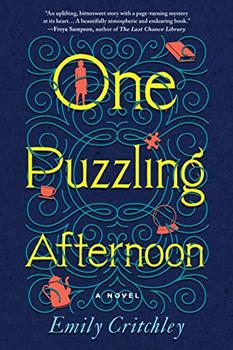Summary | Excerpt | Reviews | Beyond the Book | Read-Alikes | Genres & Themes | Author Bio

A Novel
by Emily CritchleyThis article relates to One Puzzling Afternoon
After a dementia diagnosis, the rules that families depend on — who takes care of who — just don't exist anymore. The hierarchy of parent and child or grandparent and grandchild dissolves under lost memory. Dementia is an illness that affects two people: The patient, and the person caring for them. Anger or frustration often ensues because of what has disappeared. This occurs throughout Emily Critchley's novel One Puzzling Afternoon, but a particular example is when Edie, a widow, mother, and grandmother in the throes of early-stage dementia, becomes irritated while in a café. Her son and granddaughter are unaware she has slipped into a period of the past when she was a sixteen-year-old girl. She is fussy and rude and accidentally spills hot tea on her granddaughter, Amy, who she then confuses with a waitress. Amy is devastated.
In the United States, about six million people are currently living with Alzheimer's disease and other forms of dementia. Most live in their own homes, which can make caring for them complicated. In One Puzzling Afternoon, Edie's son Daniel moves her into his home so he can look after her more closely. Many don't have that option and must depend on outside care, to the degree that it is available to them.
Johns Hopkins researchers studied 600 Baltimore residents with dementia and their caregivers and found that a shocking 97%-99% of both of these groups of people had unmet needs related to care. It can be difficult to give dementia patients care in their homes, where they may not have access to the right resources. Most stay at home even as the end of life draws near and as their condition worsens.
Dementia caregivers are also challenged because patients often lack the knowledge and reasoning skills of their past selves. But arguing, even over simple things like taking medicine, isn't the best usage of time. Cyndi Cramer, a clinical nurse educator quoted in an article from Chapters Health System, tells caregivers that by arguing, "You exhaust yourself and don't get anywhere."
In addition, if a patient with dementia wants to go somewhere, on a drive perhaps, or to see someone, it is usually best not to tell them no directly. In A Puzzling Afternoon, Edie wants to see the inspector who was in charge of her friend Lucy's missing person case 67 years earlier. Amy reluctantly accompanies her even though it seems futile. Experts encourage caregivers for those with dementia to let them maintain some independence.
Safety at home is paramount, especially since home is where the majority of dementia patients spend most of their time. So what can caregivers do to ensure safety? Make sure there aren't places where patients can slip and fall. Make sure walkers are readily available. Hide the car keys. During the day, dissuade them from taking long naps, because that can throw off their biological clock so that at night they are up and restless when the rest of the household is asleep.
Changes in spatial awareness and vision may plague those with dementia and make them feel anxious and overwhelmed. Gabriella Belacastro, a dietician who works for Chapters Health, urges caregivers to turn off the television and serve meals in a place where it is quiet. Use plates of colors that contrast with the food and table and avoid patterned napkins and tablecloths. Don't overload the plate. Offer one food at a time.
Sundowning is an important phenomenon for dementia caregivers to know about. When day becomes night, some dementia patients become fearful, anxious, or angry. They have been known to weep, pace, become depressed and violent. Routine, medication, and changes to the environment can help alleviate some of these symptoms.
The most important advice for caring for someone with dementia is to exercise patience. It's not their fault that they cannot remember. Cramer tells the story of a woman in the car with her husband, who suffered from Alzheimer's. After she touched him sweetly, he turned to her and said, "I'm sorry miss. You are very nice, but I love my wife." Upon hearing this, his wife wasn't sad. Just the opposite. She was touched that he remembered her.
Filed under Medicine, Science and Tech
![]() This article relates to One Puzzling Afternoon.
It first ran in the November 15, 2023
issue of BookBrowse Recommends.
This article relates to One Puzzling Afternoon.
It first ran in the November 15, 2023
issue of BookBrowse Recommends.
Your guide toexceptional books
BookBrowse seeks out and recommends the best in contemporary fiction and nonfiction—books that not only engage and entertain but also deepen our understanding of ourselves and the world around us.